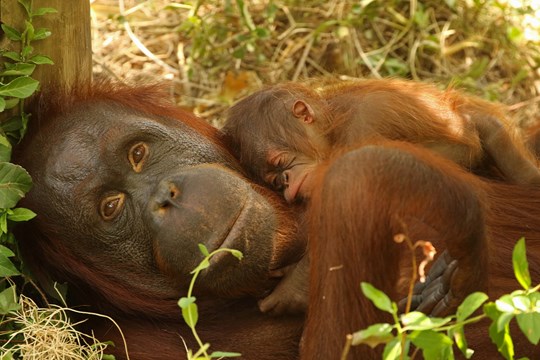
Wednesday, Jul 31, 2019
Media Release
City of Little Rock Public Relations (501) 371-6801
L. Lamor Williams
The Little Rock Zoo is proud to announce the birth of a baby female Northwest Bornean orangutan born to mother Berani and father Bandar on July 28. This is the first infant born to Berani and the fifth born to Bandar.
The baby can be seen at the great ape habitat with Berani. She carries the baby with her while she’s outside but does often shield the baby from public view by turning her back.
The birth comes at the recommendation of the Orangutan Species Survival Plan® (SSP), a program that cooperatively manages orangutan species in zoos accredited by the Association of Zoos and Aquariums (AZA) to further conservation goals. Developed in 1988, this SSP Program coordinates species conservation, research, husbandry, management and educational initiatives. The Little Rock Zoo also participates in the AZA SAFE (Saving Animals From Extinction) program for orangutans. AZA SAFE programs combine the collective strength of AZA organizations to help save species in the wild.
Native to the Borneo, Northwest Bornean orangutans are listed as critically endangered by the International Union for Conservation of Nature (IUCN), meaning there is a very high risk of extinction in the wild in the immediate future. Their vulnerability is mainly caused by habitat loss and fragmentation of their home. It is estimated that between forty-five and sixty-nine thousand (45,000 and 69,000) Northwest Bornean orangutans remain in the wild.
To learn more about the Zoo’s new orangutan baby, please contact llwilliams@littlerock.gov
About the Zoo
The Little Rock Zoo is accredited by the Association of Zoos and Aquariums. Look for the AZA logo whenever you visit a zoo or aquarium as your assurance that you are supporting a facility dedicated to providing excellent care for animals, a great experience for you and a better future for all living things. With its more than 200 accredited members, AZA is a leader in global wildlife conservation and your link to helping animals in their native habitats. For more information, visit www.aza.org.


 E-NEWS
E-NEWS
 EXPLORE
EXPLORE
 NEWS
NEWS
 TRANSLATE
TRANSLATE
